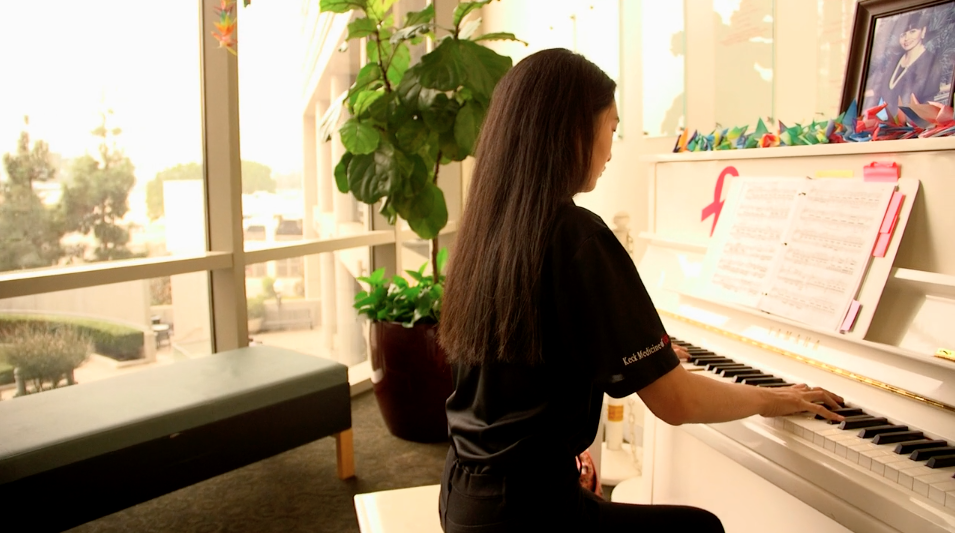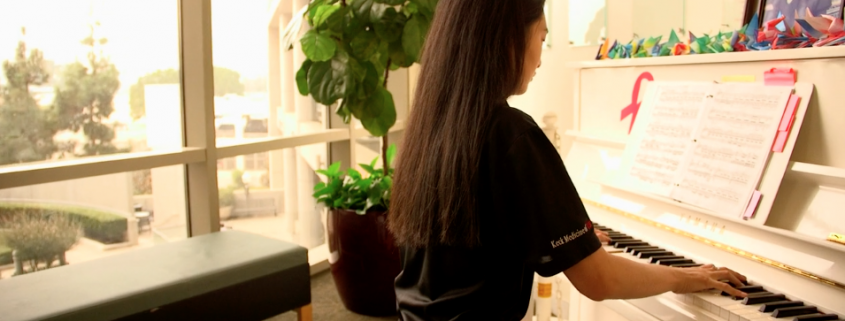Healing through music: Medicinal Music Makers brings harmony to hospitals

Long before she stepped onto campus, Valerie Narumi, a senior majoring in neuroscience, already had an idea in mind on how to get involved.
She wanted to continue volunteering at local hospitals as she had done in Orange County through middle and high school, rolling her piano keyboard on wheels within each building and playing for patients in those facilities.
Upon being accepted to USC, Narumi realized that the University did not exactly have the type of organization she was looking for that allowed for volunteers to play music in hospitals.
Forgoing disappointment, Narumi took the initiative by reaching out to the patient experience department at Keck Hospital. She held conversations with them about potentially forming a program where people are able to go inside the facility and play music, to which the hospital excitedly said yes.
After a summer of planning, Narumi’s first few weeks of the Fall 2017 semester were spent registering and attending required meetings to formally recognize the organization. When all the paperwork was signed and settled, Narumi had founded Medicinal Music Makers.
According to Narumi, Medicinal Music Makers is an organization dedicated to spreading music’s healing powers to patients, families and medical staff.
“When you go to the hospital it’s usually very, very quiet, and very desolate … And if me or any of the musicians [go] there … and just play something, even in the background, and if even one patient or doctor is able to have a little bit of a better day because of it, I think that would be the main purpose of this organization,” Narumi said.
Prior to the coronavirus limiting many in-person activities, Medicinal Music Makers would guide volunteers by signing them up for the Keck Hospital onboarding process, including standard training, health screenings and background checks. Afterward, Medicinal Music Makers would schedule volunteers to play music, such as performing piano in the Keck Hospital atrium for about an hour. For people who were still interested yet don’t play music, the organization created opportunities for them to help make sure that everything is running smoothly.
Due to the coronavirus, the volunteer services at Keck Hospitals have been suspended indefinitely. In order to continue bringing music to hospitals, Narumi reorganized the organization.
“So over summer, I came up with the idea to do a virtual concert where people can send in video or audio performances of theirs,” Narumi said. “And we’ll culminate into like a one 30-minute video that go up every other week.
According to Narumi, anyone is able to send in a performance of theirs that they’d like to share, no matter how old the video. That’s how Tracy Wong, a first-year doctoral student studying piano performance and now co-communications director, first got involved with the organization.
Apart from wanting to be involved within the University, the messaging and mission of Medicinal Music Makers is what drew Wong in. Wong received her bachelor’s in psychology and piano performance from Oberlin College, so the connection between music, science and the healing arts has been important to her. However, as she pursued her master’s degree in piano performance, Wong was not able to explore her other interests.
“So coming [to USC] because I know obviously, the Keck School of Medicine is huge at USC, I was already on the lookout for something that would satisfy that itch to connect the two things in my life, so [Medicinal Music Makers] was perfect,” Wong said.
As a piano teacher, Wong has also seen firsthand how music has been able to assist others.
“I’ve had students who have come to me who are living with Parkinson’s. And after an hour or two hours of a lesson and focusing attention on these minute details that they’re playing with their fingers, that tactile action actually helps a lot with Parkinson’s disease. And the shakes are noticeably better for like the day after a lesson or something like that,” Wong said.
For Antoinette Perry, the faculty advisor of Medicinal Music Makers, being a part of the organization has shown her a lot about the healing powers of music.
“I always knew [music] provided healing to the soul that I didn’t realize that it also aids in healing the physical body so that was a big surprise to me,” Perry said.
Even while virtual, Wong is glad that the organization is still able to serve its purpose. As view counts on the videos go up, indicating that people are watching and listening, Wong appreciates that the videos can “bring a little bit of levity and a little bit of beauty into people’s lives.”
“I think that that feeling is only going to grow, because I’ve only gotten like a virtual version of it. I think it’s going to be increasing tenfold when we’re all back in person and we’re able to actually bring our performers into the hospital as volunteers and watch people’s reactions live and give them a little bit of our time like that,” Wong said.
According to Wong, the group has been in talks of continuing the virtual concerts in addition to in-person performances. Kenneth Cunanan, a first-year graduate student studying biomedical engineering and the co-communications director of Medicinal Music Makers, hopes to one day experience how it felt like to be at the hospital in-person. So far, though, Cunanan has enjoyed being in the group as it functions now.
“We have a pretty good sense of camaraderie. I think we mesh well together, and we’re pretty welcoming for new members and current members,” Cunanan said.
Overall, Perry describes the organization as a reminder to music students of what their purpose is in studying music.
“Sometimes we lose sight of that when we spend so many hours in the practice room, and we’re just thinking of ourselves, and how good we’re gonna get,” Perry said. “And it’s very gratifying for them to see how gratifying it is to be able to improve the lives of others and to be able to bring beauty into the world.”

